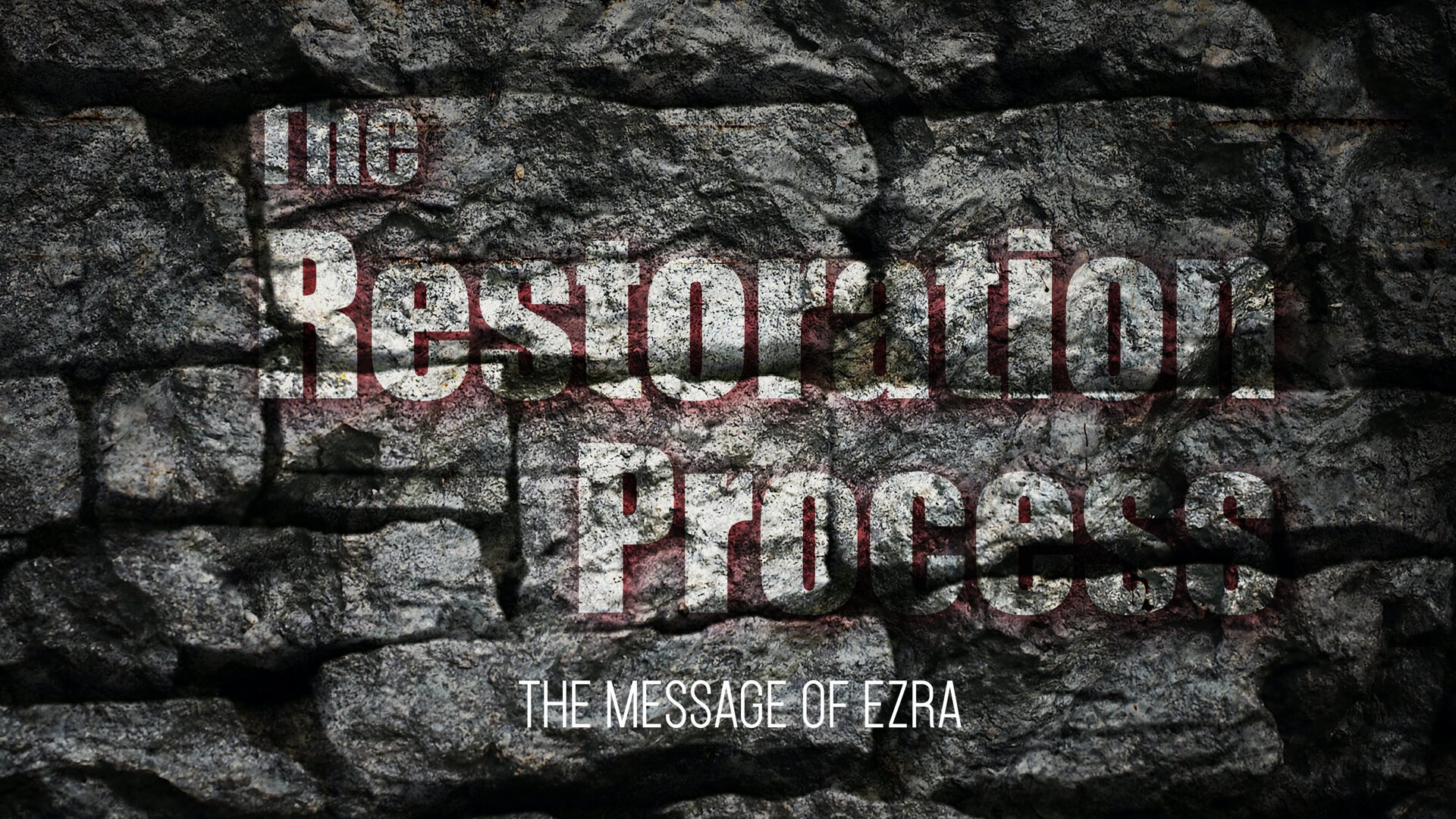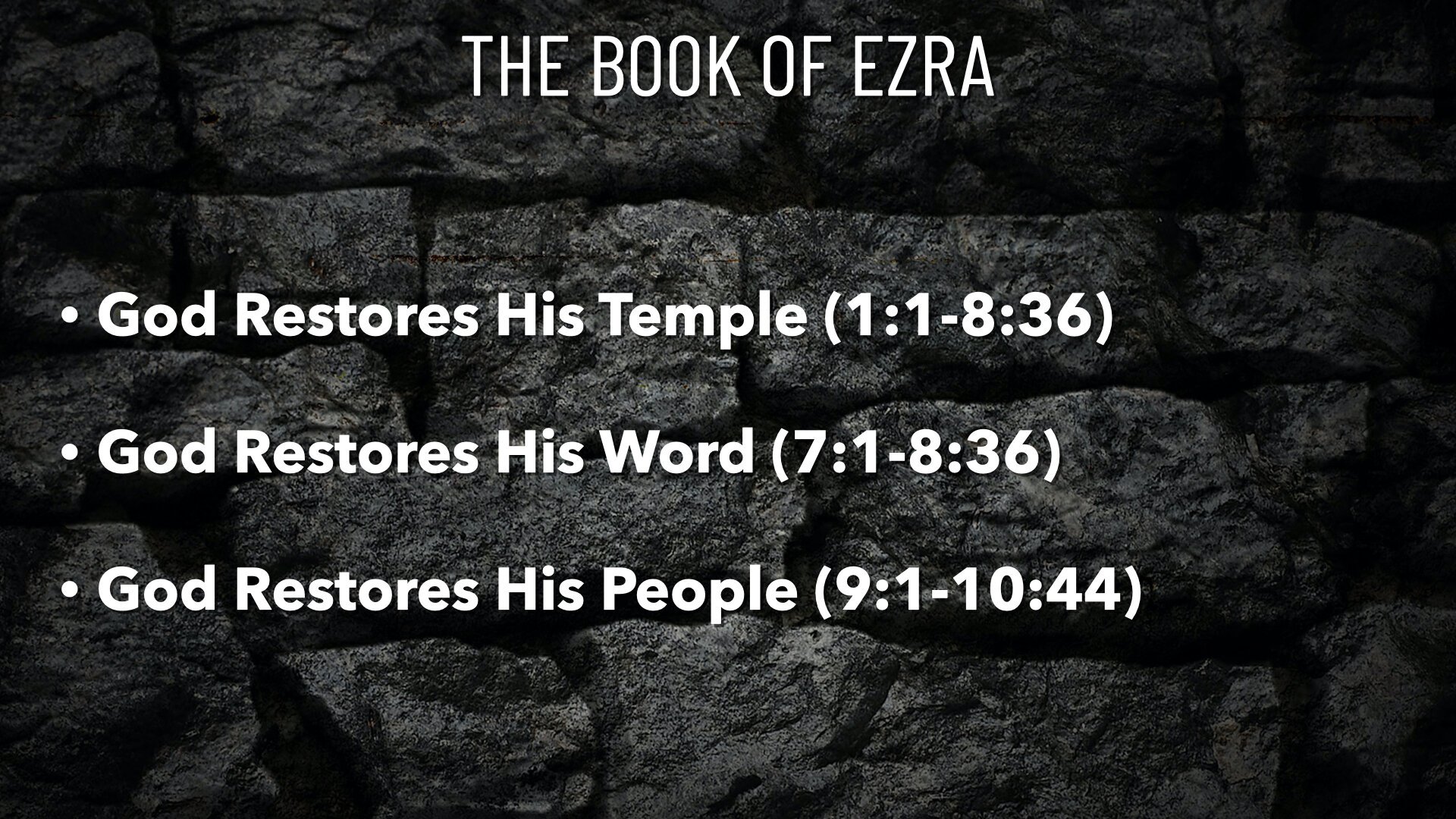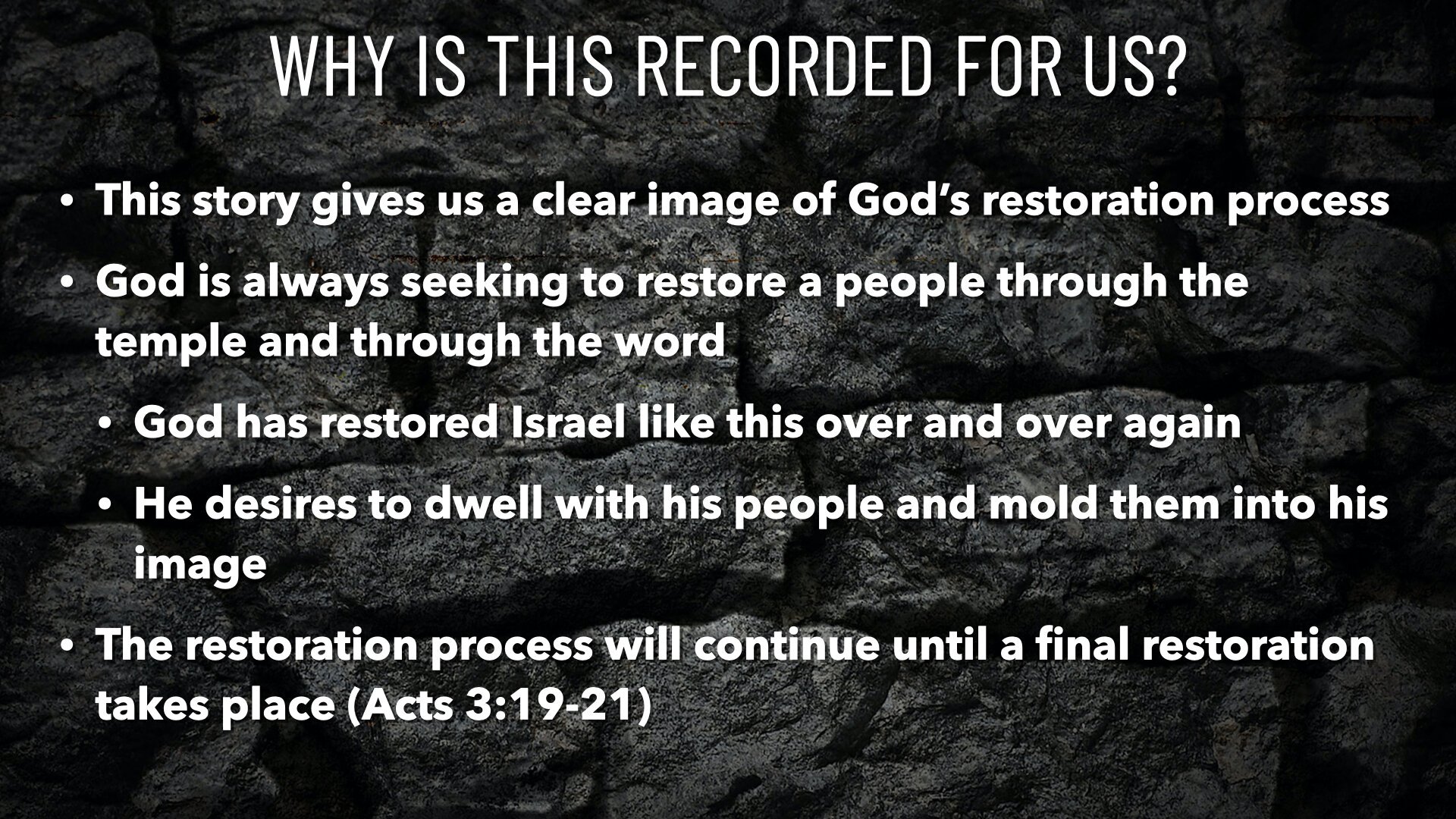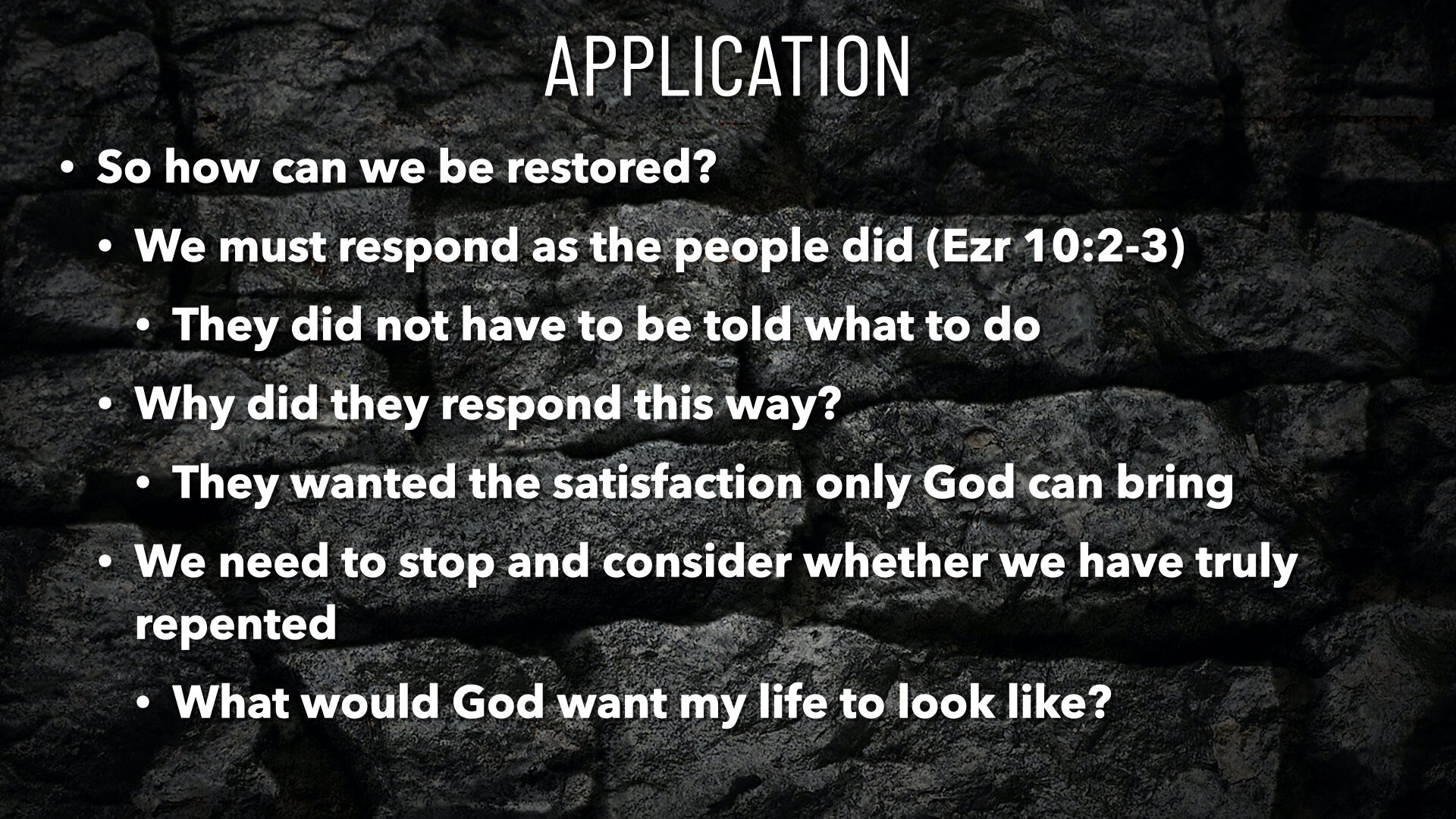The Restoration Process (Ezra)
September 15, 2019
I wanted us to see the message of this book from a high level because I believe it provides us with a foundational understanding of how God's restoration process. Ezra, Nehemiah, and Esther are narratives of what happens after the 70 years of exile. In Ezra, we have a total of ten chapters that cover approximately 100 years. In the first six chapters, we have a record of the first exiles to return to Jerusalem and rebuild the temple under Zerubbabel. Then, in the last four chapters, we have a record from Ezra of his return to beautify the temple and teach the people.
The book divides nicely into two sections when we look at a timeline, but when we look at the topics discussed in the book, we see three parts: 1) God restores his temple. 2) God restores his word. 3) God restores his people. These three ideas are what we will explore in this lesson. First, let's start by reading the first four verses of the book and begin to think about how God's hand restores.
God's Restores His Temple (1:1-6:22)
Ezra 1:1--4 (ESV) --- 1 In the first year of Cyrus king of Persia, that the word of the Lord by the mouth of Jeremiah might be fulfilled, the Lord stirred up the spirit of Cyrus king of Persia, so that he made a proclamation throughout all his kingdom and also put it in writing: 2 "Thus says Cyrus king of Persia: The Lord, the God of heaven, has given me all the kingdoms of the earth, and he has charged me to build him a house at Jerusalem, which is in Judah. 3 Whoever is among you of all his people, may his God be with him, and let him go up to Jerusalem, which is in Judah, and rebuild the house of the Lord, the God of Israel---he is the God who is in Jerusalem. 4 And let each survivor, in whatever place he sojourns, be assisted by the men of his place with silver and gold, with goods and with beasts, besides freewill offerings for the house of God that is in Jerusalem."
God Still Loves Them
The first thing we read in this text is hard to believe when we think about it. God has not abandoned his people. In spite of all the calamity that God has brought on his people for their sin, he still loves them, and he still wants to have them as his own. These people have committed great atrocities like murdering their children in serving other gods (Eze 23:37), bringing idols into the temple (Eze 8), and murdering God's prophets (Acts 7:52). So he has wiped out the majority of them and now he works to restore a remnant through Cyrus, the king of Persia, who God has called by name over 200 years earlier through the prophet Isaiah (Isa 44-45). Cyrus has defeated the Babylonians 70 years after they had defeated the Jews. But he does not claim to have done this through his hand. Cyrus says, "The Lord, the God of heaven, has given me all the kingdoms of the earth." Here we read that God has acted to bring about this significant shift in the kingdoms of men so that his people can return to their country and rebuild what God has torn down.
Rebuilding and Beautifying The Temple
Imagine what it would be like to pack up all that you own and move to a city that is destroyed, covered in large stones, and burned up wood. There were no bulldozers or cranes. The work would be hard and demoralizing, and underneath all of that debris lie numerous skeletons of bodies that were never properly buried. We might wonder why people would agree to such a task. Verse 5 says that God stirred up the spirits of his people to rebuild the house of God. They are going to Jerusalem to rebuild the house of the Lord (Ezr 1:5) because the temple was the one thing that made Israel great. It signified a relationship with the God of heaven who at one time rescued his people from Egyptian slavery. It also signified a relationship with a God who was willing to make Israel his treasured possession and bless them beyond what they deserved. Jerusalem is the place where he has caused his name to dwell in the past, and he promised to come back after his people return.
Chapter 2 lists many of the 42,000 returned to rebuild the temple. There were priests, Levites, temple servants and sons of Solomon's servants. In Chapter 3, they build an altar to worship the Lord "according to the law of Moses," and they celebrate the Feast of Booths. Then, in the second year, they complete the foundation of the temple. But, sadly, there were several setbacks for the people when they arrived. After they laid the foundation of the temple, there was a great joy but also great sadness and discouragement. You see, many of the priests, Levites, and older men who had seen the last temple were weeping and wailing due to the inferiority of the new temple foundation. Another setback the people encountered was opposition from the surrounding nations. In Chapter 4, we read that adversaries tried to join themselves to the Jews and help rebuild the temple. They acted like they wanted to help, but they had intentions to make this temple into a form of idol worship instead of what God had set up according to the law of Moses. So, Zerubbabel, Jeshua, and many of the heads of the houses told them to go away because God's people hold to a standard of holiness and purity that cannot be compromised. This resistance showed that the remnant has a different attitude toward this building project than the generations before them. But the people of the surrounding lands didn't like this, and they began to harass the people and make it difficult for them to build anything. God's people were willing to stand against apostasy, but fear of the surrounding adversaries paralyzed them.
This went on for many years, and the temple remained unbuilt. It took God's acting to stir the people up over two decades later using the prophets Haggai and Zechariah. When these prophets spoke, they rebuked the people for building their own houses while God's house remained unbuilt (Hag 1:4). So, Zerubbabel and Jeshua again sought to rebuild the temple, and the prophets were providing encouraging words as they pointed to God's purpose behind this project. Haggai tells them that even though what they are building is nothing compared to what they had, God is with them, and that is what matters (Hag 2:4). The adversaries rose up again, but this time the people stood their ground and kept working. At the same time, God rose up a new king, Darius the Great, who helped them finish the work. The temple project was completed in 515, about twenty-four years after the people were able to return. Then all the people came to worship "according to the Law of Moses."
In Chapter 7, we are told: "After these things, in the year of Artaxerxes king of Persia, Ezra..." We just fast-forwarded about 50 years in time to around 457, and now, finally, we hear about the man the book is named after, Ezra. King Artaxerxes sends Ezra to Jerusalem with a mountain of gold, silver, and animals for sacrifices to God. We are not explicitly told why he is doing this at first, but his decree sounds a lot like Cyrus' decree in Chapter 1. Ezra records a detailed letter from the king to all the nations in the Western half of his kingdom that encourages God's people to return and sets them up with no taxes. Here is Ezra's response to the king's actions.
Ezra 7:27--28 (ESV) --- 27 Blessed be the Lord, the God of our fathers, who put such a thing as this into the heart of the king, to beautify the house of the Lord that is in Jerusalem, 28 and who extended to me his steadfast love before the king and his counselors, and before all the king's mighty officers. I took courage, for the hand of the Lord my God was on me, and I gathered leading men from Israel to go up with me.
We see one critical point repeated throughout the majority of this book: It was God who worked to bring about the re-establishment and beautification of his temple. The kings Cyrus, Darius, and Artaxerxes were compelled to provide what is needed to build the temple and beautify it. God's hand is written all over the restoration that comes from the kings of Persia.
God's Restores His Word
But Ezra's coming wasn't so much about beautifying the temple as it was about teaching the law of God. Listen to what the text says about Ezra in verse 6 of Chapter 7.
Ezra 7:6 (ESV) --- 6 this Ezra went up from Babylonia. He was a scribe skilled in the Law of Moses that the Lord, the God of Israel, had given, and the king granted him all that he asked, for the hand of the Lord his God was on him.
Here we see that God is using the king to send Ezra for a particular purpose. Did you catch the purpose? That purpose is more clearly laid out in Nehemiah, but notice that it is repeated in verse 10.
Ezra 7:10 (ESV) --- 10 For Ezra had set his heart to study the Law of the Lord, and to do it and to teach his statutes and rules in Israel.
God has sent Ezra to preach to the people of God and teach them the word. Many Jewish sects of Jesus' day (Pharisees, Sadducees, and scribes) claimed that their religious schooling stemmed from Ezra. 7:26 says Ezra established God's law for all of the people west of the Euphrates. All of them were supposed to abide by the law of God (26). God made his law equal to the king's law at that time. The word of God was going to spread so that all could see and understand the wisdom and power of God. The king's words and Gods' law had such an impact that those who at one time had opposed Judah (4:7-23) were now supporters as well (8:36).
God's Restores His People
When Ezra arrives and begins teaching the law to the people, something amazing happened.
Ezra 9:1--4 (ESV) --- 1 After these things had been done, the officials approached me and said, "The people of Israel and the priests and the Levites have not separated themselves from the peoples of the lands with their abominations, from the Canaanites, the Hittites, the Perizzites, the Jebusites, the Ammonites, the Moabites, the Egyptians, and the Amorites. 2 For they have taken some of their daughters to be wives for themselves and for their sons, so that the holy race has mixed itself with the peoples of the lands. And in this faithlessness the hand of the officials and chief men has been foremost." 3 As soon as I heard this, I tore my garment and my cloak and pulled hair from my head and beard and sat appalled. 4 Then all who trembled at the words of the God of Israel, because of the faithlessness of the returned exiles, gathered around me while I sat appalled until the evening sacrifice.
When the word of God was spoken clearly by Ezra and explained, there was a response of the people. They point out their own sin of idolatry and becoming like the nations around them. After they had rejected the nations who wanted to help build the temple nearly 100 years earlier, now they realize that they have let those evil, idolatrous people into their homes. They were allowing them to bring up the next generation of children! So we see the people, and even the leaders, being confronted by the truth of God's word, being cut to the heart, and exposing their sins before Ezra so he could help them navigate how to respond. In response, Ezra tears his garments, pulls out his hair from his head and beard, and sits appalled. Read what happens among the people in Chapter 10.
Ezra 10:1--3 (ESV) --- 1 While Ezra prayed and made confession, weeping and casting himself down before the house of God, a very great assembly of men, women, and children, gathered to him out of Israel, for the people wept bitterly. 2 And Shecaniah the son of Jehiel, of the sons of Elam, addressed Ezra: "We have broken faith with our God and have married foreign women from the peoples of the land, but even now there is hope for Israel in spite of this. 3 Therefore let us make a covenant with our God to put away all these wives and their children, according to the counsel of my lord and of those who tremble at the commandment of our God, and let it be done according to the Law.
The book ends with a heart-wrenching scene as Ezra and all the people are weeping and confessing their sin. But they don't just mourn their sins, and they don't even wait for Ezra to tell them what to do. They decide to do something drastic to avoid God's wrath and show their appreciation for what God has done for them. They decide to put away their wives, and the rest of the chapter describes the people who did that.
Why Is This Recorded For Us?
Ezra is a great story, but does any of this apply to us? Throughout this story, we have a clear image of God's restoration process. We see that God is willing to save a remnant and remain faithful to all of his covenant promises to Abraham even when it looks like he has given up on them. We find great encouragement as we learn about God's power, love, and faithfulness. As God has restored Israel throughout history, we see that it is his hand that brings about all of this restoration. He restores the temple because he always desires to be with his people. He restores his word because his people must know who he is and what he has done to be like him. God recorded this story for us to understand the process of restoring our relationship with him. He works to dwell with us and give us his word so that our hearts can be restored.
How Can We Be Restored?
Ezra is a critical book for us because it foreshadows God's continual restoration process for future generations. Peter points to this idea in Acts 3:19-21, calling for repentance and times of refreshing until the final restoration. But we must ask ourselves the question, "Is this us?" Are we like these people who gathered around Ezra, confessed their sins, and make drastic changes? In Ezra 10 the people said, "We have broken faith with our God and have married foreign women from the peoples of the land, but even now there is hope for Israel in spite of this. Therefore let us make a covenant with our God to put away all these wives and their children, according to the counsel of my lord and of those who tremble at the commandment of our God, and let it be done according to the Law" (Ezra 10:2-3 - ESV). They recognized that...
1. Their sin had "broken faith" with their God
2. There was still hope in spite of this
3. They had to remove their sinful activity completely
Is this our attitude when facing significant sins in our life? Notice how they did not wait until Ezra told them what they needed to do. They did not even ask Ezra what they needed to do. They knew that God's word says they were not to marry foreign women because of the temptation to be idolatrous (Deuteronomy 7). This is the very act that got their ancestors destroyed! Having foreign wives was separating them from God, and the only solution is to cut them off! I want to suggest that this is how true repentance looks. True repentance is a willingness to pursue holiness for the Lord out of love for him. These people were actively seeking to do what they knew God would want them to do. Ezra did not tell them they had to do this! God did not give them a command to do this. He just let his word speak for itself, and people who genuinely love him want to line themselves up with the word. Think of how devastating and life-altering it would be for us to separate from your wife and children. Why would they do that? They realized that obedience to God and the relationship they have with God is more important than an idolatrous life in sin. They were willing to do what Jesus tells us to do and "cut off their hand" to receive eternal life (Matt 5:30).
All of us need to stop and consider what areas of our life need repentance. Regardless of whether God has specified our specific sin, we must decide to do what God would want. How would God want my marriage to look? How would God want my everyday demeanor to look? How would God want my lifestyle to look? When we look at ourselves in this way, we see that drastic changes need to be made to show a truly repentant heart, and we seek to make those changes.
Conclusion
It is an amazing thing that God still loves us like he loved his exiled people. Ezra is a great book of God's work in restoring Israel after their sin has brought them to destruction. We must go through the same restoration process as we have seen in Colossians. We must die and be raised to walk a new life. If we will hear his words of hope and love and turn our hearts away from whatever is causing us to stumble, God will help us to see our error and provide reconciliation through the one great mediator, Jesus Christ. Once we return to God, their story becomes our story as we are called to suffer and wait for an even greater hope to be realized.




